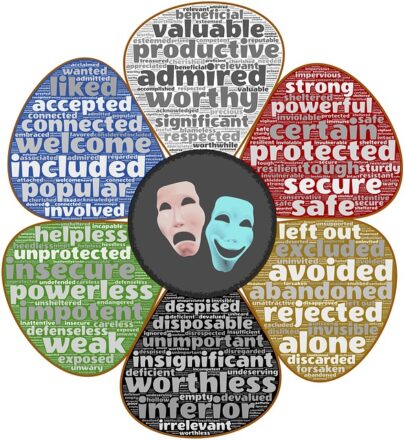This morning I woke up around 4:40 am as usual, because I’m getting older and I have to go use the restroom about that time. After I got back in bed, I dozed off, but the rest of my sleep was rather light and restless. Over and over in my sleep I kept hearing an old verse that I learned years ago, “perfect love casteth out all fear.”
Now, to be honest, I have been in a process of recovery lately. I’m in the stage where I have been detoxing from religion. I have still been talking to God (though irregularly—but, hey, at least I’m still on speaking terms). I haven’t read the Bible in months, and I haven’t been to church since October. I have altogether avoided any religious influence, other than chats with friends, and support groups that help with my recovery process.
So, needless to say, at first I was rather annoyed that this Bible verse kept tormenting me in the early morning hours. Yet it has nagged at my mind all day long as I wondered, what can that verse really mean? On the surface, it sounds comforting and I surely could use some comfort!
Well, this evening I decided to look it up. I got involved in it the way I used to do. My mind is still trying to wrap around the concepts. I will share them with you, knowing that tomorrow I may not read any more. Maybe this was enough for me to chew on for a long while.
My understanding of 1 John 4
“7 Dear friends, let us continue to love one another, for love comes from God. Anyone who loves is a child of God and knows God.”
The cult taught that “sloppy agape” love was not true Christianity. It taught that one had to follow a three step formula to get saved: Repentance, Baptism in Jesus’ Name, and the “infilling of the Holy Ghost as evidenced by speaking in other tongues.” This verse says that ANYONE who LOVES is a child of God, and KNOWS God. That means that many who we were taught were lost are really God’s children and know Him intimately.
8 “But anyone who does not love does not know God, for God is love.”
In the cult, there was a lack of true love. “Love” and acceptance came only with a price tag. You did as the leadership wanted you to do, and you were “loved.” You questioned the rules or the leadership’s decisions at all and you experienced shunning, punishment, hatred and vicious disdain. Yet that very “sloppy agape” that was made fun of from the pulpit—that very thing is what determines a person’s belonging to God, according to these verses! So, here it says plainly that if anyone does not love, he does not even KNOW God! God is love, so if you know God you show love. No love=no God.
“9 God showed how much he loved us by sending his one and only Son into the world so that we might have eternal life through him.”
God showed us what REAL LOVE is—by sending his only begotten son to sacrifice his life for our sins. THAT is real love—it wasn’t conditional based on our performance or righteousness. If we have real love, it has to be patterned after that—Unconditional.
“10 This is real love; not that we loved God, but that he loved us and sent his Son as a sacrifice to take away our sins.”
The real love is not us loving a God who sacrificed everything for us, because all of us can recognize that he DESERVES our love. Real love is that He sent his Son to be a sacrifice, giving his life, because he saw we were sinners. Sinners—we didn’t deserve anything but death. He gave us what we DIDN’T deserve—that is REAL LOVE!
“11 Dear friends, since God loved us that much, we surely ought to love each other. 12 No one has ever seen God. But if we love each other, God lives in us, and his love is brought to full expression in us.”
Since God loved us that much…Unconditionally…when we did not deserve it in the least…when we were unlovable…when we were filthy in his sight; because of that, we ought to surely be able to love one another. There has never been a gap any wider than that between God and the sinful human. If He could breach that gap with His love, then anything is possible!
IF we love each other, God lives in us and loves through us. This indicates that the opposite is also true. Does this mean that if we do NOT love each other that God does NOT live in us? If he cannot show his love through us, because we do not let His love into our lives, does that mean we are not His?
“13 And God has given us his Spirit as proof that we live in him and he in us. 14 Furthermore, we have seen with our own eyes and now testify that the Father sent his Son to be the Savior of the world. 15 All who declare that Jesus is the Son of God have God living in them, and they live in God. 16 We know how much God loves us, and we have put our trust in his love.”
The 13th verse seems to back up cult teaching that being God’s and His living in us is based upon whether or not we have His Spirit. However, the verses before and after clearly state that ‘God’s love in us is the true proof of belonging to him,’ so, we have to take the verses in context. Because of this, it seems to me that His Spirit being in us or not is not a matter of whether or not we speak in tongues, but whether or not we have and show His love!
It goes on to say that everyone who declares Jesus as the son of God is infilled with God’s Spirit. There is that idea again—the one we were indoctrinated against because it is just too easy. To declare Jesus as the Son of God is not EARNING anything. Humanity cannot seem to grasp the concept of simple faith and getting something as valuable as salvation without effort. Yet, here it is again and again. We have him living in us and we live in him by our declaration that He is God’s Son.
This involves a rudimentary understanding of God’s love—the REAL love of God—the unconditional love. By trusting Jesus to be our Lord and Savior, we have put our trust and faith in that unconditional love. We have given up trying to earn our salvation and we have embraced the idea of His unconditional love that caused him to come and sacrifice His life for filthy sinners, loving us in spite of our condition. To wrap our hearts around that kind of love is a spiritual work of faith that really is quite a bit more challenging to the human mind than the idea of striving to DO in order to receive. Think about it! Isn’t it mind-boggling that the God of the Universe sent his son to die for people who were sinners and were not able to pull themselves out of the filth? He took the place of every sinner in order to show His love and to free us from our sin. He says we simply receive that gift and love Him and others in return.
“God is love, and all who live in love live in God, and God lives in them.17 And as we live in God, our love grows more perfect. So we will not be afraid on the day of judgment, but we can face him with confidence because we live like Jesus here in this world.”
We all know that God is love. It is a basic fact we learned as children. But, here we see that all who live in love really live in God. Think about that for a second. If God is love, then to live in God means to live in love. To have God in your life automatically means you have love in your life.
The more God we have and the more we live in Him, the more perfectly we are able to love others. That completely undoes the life many of us have lived within cults. “Godliness” and “Holiness” cannot mean a list of rules one follows. It cannot then relate to judgmental attitudes and haughty spirits who feel that they are more “godly” than others. In fact, it is completely the opposite! The more “godly” we are, the more we will LOVE others—all others, even those who least deserve it.
“To be like Jesus, to be like Jesus, on earth I long to be like him”…remember hearing it during altar calls where you were guilt tripped into crying and repenting over everything imaginable, including your lack of following the rules?
That is not what being like Jesus means! Living like Jesus here in this world means loving like He loved, showing compassion like he did, mercifully befriending the outcasts. When we live like this, we don’t have to be afraid on the day of judgement. We can come to him with confidence because we lived like him here in this world—overflowing with love towards the unlovable and the lowly.
“18 Such love has no fear, because perfect love expels all fear. If we are afraid, it is for fear of punishment, and this shows that we have not fully experienced his perfect love.”
Speaking of the judgment day, when we live in His love and His love is shown through us, we don’t have to be afraid, because this love relationship gets rid of all fear. What a revelation!
Life in a cult is based on fear. Fear, shame, and guilt are running our lives when we are trying to live by the rules and earn our salvation…always trembling lest we somehow fail and fall into the hands of an angry God. No, no, no! That is not what God wants for us!
If we have fear, it is because we think God is just waiting to punish us. That thought pattern shows that we haven’t really had a full experience of his “perfect love.” Wow! Did you get that?
How is it that one like me can spend forty years of life living to the best of my ability to try to please God and thinking that I had to work harder and harder to measure up—only to realize I had no clue who God really is?
When we understand His perfect love, His unconditional love, there is no longer fear. He is going to love me when I am doing well, and he’s going to love me just the same when I’m covered in mud and filth. He is not searching for an opportunity to punish me. He loves me and he wants me to love him and others. There is no fear in that at all!
This is why a chorus I learned after leaving the cult meant so much to me: “I’m no longer a slave to fear, I am a child of God.”
“19 We love each other because he loved us first.”
How are we able to love each other? Because He loved us first and showed us what love looks like.
“20 If someone says, “I love God,” but hates a fellow believer, that person is a liar; for if we don’t love people we can see, how can we love God, whom we cannot see? “
How many liars have you known down through your years in cult environments? I’ve known a lot. I doubt any of them would admit to actually “hating” anyone…but “actions speak louder than words” is an old adage that holds true in this case as well. Lack of love is the same as hatred.
I grew up in a conservative preacher’s home. I heard the verbal vomit about the “liberal” leadership and neighboring pastors who “don’t believe fat meat is greasy.” I heard preachers who claimed to be holy and godly spout out comments like “he’ll never amount to anything,” “he’s good for nothing,” “I wouldn’t give you a plugged nickel for him,” and “I won’t give him the time of day.” These comments were all in reference to other ministers or saints who were in the same organization with the same doctrine, but disagreed over rules and standards of living.
Where is the love in that? Can you say you love God when you talk about another believer in this fashion? When you can be in the same room with another believer and completely avoid talking to him or her because you can’t stand them, is that love? How can you say you love God and behave in this fashion towards his other children?
“21 And he has given us this command: Those who love God must also love their fellow believers.”
It is a command…the true and only command to indicate our salvation.
What a lot to take in! It really is all in the concept of love. Remember Jesus saying that all the Ten Commandments could be condensed into loving God and loving others? That really is all it is about. It isn’t difficult to measure up, and it isn’t supposed to be an anxiety trip. It is all in that one little word, LOVE.

















